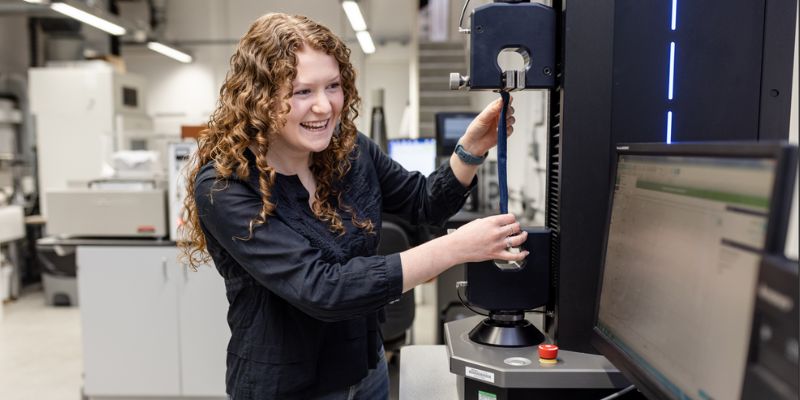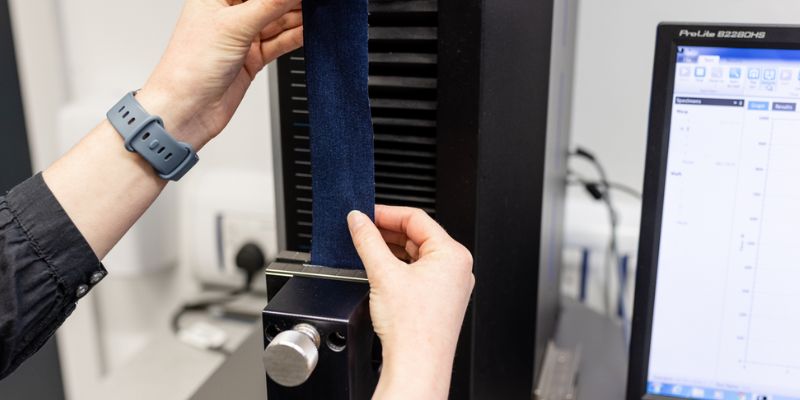Meet the Researcher: Kate Morris

Have you ever wondered what researchers at a University actually do and what led them to pick their area of research? In our new Meet the Researcher interview series we find out how our researchers got to where they are now, what excites them about their field of research, and what their current projects are. Each blog will feature one of LITAC’s researchers talking about their career journey so far and their hopes for the future of their research and academic journey.
In the first of our interview series, we sat down with Kate Morris a LITAC PhD Researcher in her first year investigating the physical and emotional durability of garments and how this could facilitate circular fashion alongside her supervisors Dr Mark Sumner and Dr Mark Taylor in the School of Design.
Hi Kate, so to start can you take us through what your academic journey been and why you make the decisions that you have so far?
I was quite lucky in the fact that I knew what I wanted to do from a young age and I knew I wanted to go into clothing and textiles. I wasn’t quite sure what part of it, but I knew I wanted to go into that sector. I chose textiles, business studies, psychology, and history as my A levels which all worked together for a fashion business route. Then I started looking at degrees, I originally applied for Fashion Marketing because that was the area that I was interested in but I just missed out due to my grades. Although because I did science at A level which was psychology, I got offered a place on Fashion Technology at University of Leeds instead so I thought why not? I wanted to go to Uni, I wanted to do something in this subject. It was probably the best thing that's ever happened to me because it's exactly what I actually wanted to do I just didn't know it was out there.
I came to University for four years, I did a placement year and in my third year I worked at an outdoor clothing brand as a Fabric Technologist. They then offered me a job to come back to after University, I graduated from Leeds and then when I went into industry for two years. I actually had to come back to Leeds for my graduation two years later because of Covid, which is when I bumped into Mark Taylor one of my current supervisors. He told me about his PhD opportunity, at the time I wasn't necessarily looking to do a PhD, I was looking for a new job. I had been in my job a couple of years and I was ready for something different. It was definitely fate as I didn't do a Masters which I think is a bit unconventional. I think most people do a Masters and then go into their PhD, but because I'd had a few years of industry experience and it directly related to what the PhD was about it was the equivalent to Masters, so that's how I got here.
What inspired you to apply for a PhD Scholarship?
I wanted to do something that I felt was actually contributing towards something positive. I was working in the fashion industry but I was just feeding into the problem and not actually helping to solve it. That was my personal inspiration for applying fo the PhD project. I feel like I am actually doing something concrete, such as feeding into new legislation that will make a difference. When i read through this PhD opportunity, I thought this is exactly where I need to be.
How did you find the application process for your PhD? What kind of steps did you have to go through?
I wouldn't say the process was complicated, but I would say there was quite a lot to it. I needed a few references, there were four questions where you had to write a mini essay for each question asking why you wanted to do it, what skills you had and how that would feed into the PhD topic. I then did a virtual interview with my now Supervisors and they contacted me about a week later and that was it. I think the perception is that it’s really tough to go through the PhD process, but it felt more like a job application/interview.
Can you tell us a little bit about the PhD research project that you are doing?
The project is looking at physical and emotional durability of our clothes and trying to prolong the lifespan of them physically while encouraging people to wear their clothes for longer. We want to understand what influences people's behaviour when it comes to the utilisation and disposal of their clothes. It's split into two parts, for the physical analysis we're doing lab work and we're trying to find out common modes of failure. Through this research we aim to advise brands and retailers how they can improve their clothing. We are also we're looking at the emotional part, how we can educate the consumer because a lot of the time people don't really understand how to care or how to dispose of their clothing in a responsible way.
What aspects of your research do you enjoy the most?
I have a couple, from the physical testing point of view I've got close to 1000 garments at the University right now and that's just phase one of the project. You can imagine there's a lot of testing going on. As more data is collected interesting trends start to occur. I really enjoy analysing and comparing the results and then realising why products are performing differently. It is almost like a puzzle and you have got to try and figure out why that's happening. It is also satisfying to be able to tick things off the list as the project progresses, it feels like you're really contributing and making some headway. I have also really enjoyed reading academic literature and writing up my research as well. I've learned a lot through that which I can then apply to other areas of the project. I didn't think I would enjoy it as much but as I delve deeper into the project I want to absorb as much knowledge about my subject as I can.

What do you want to achieve through your research?
I think the main thing is contributing to commercial information so brands can implement changes around how they are working for the better, that is what is important to me What we're developing within the PhD is a minimum durability standard, and that's something that we can share with industry and policymakers. That's the main goal and outcome of the PhD for me is to provide something concrete that people can use.
What does a typical day look like for you? What is the day in the life of a PhD researcher?
It's a real mix for me of lab work and sitting at my computer answering emails and reading papers. I've been lucky enough to have help on the project primarily with the laboratory testing workload. There are a lot of garments and a lot of work, and I simply couldn't do it by myself within the timeframe of the Phd. So, my days include helping her where I can and then there are academic milestones that you have to hit. My transfer Viva is coming up so I am writing a 10,000 word report for that. It's not just research all the time. I’m also working with a lot of external brands. I'm managing that and managing logistics of getting the garments sent here. There's a lot of organisation from that point of view making sure I know what we’ve received and keeping track of everything. My days vary but are always busy.
What's next for you and your research and your future aspirations?
Completing the first phase of testing and analysing the data is the main objective currently, plus starting to explore the ways I can investigate emotional durability further. My focus is very much on my PhD at the moment. It does absorb your whole mental capacity but going forward durability is a topic that I am passionate about and want to continue researching. I would like my own business someday, however that is very much a pipe dream at the moment. I want to focus on my work over the next couple of years and then see where life takes me!
Finally would you have any advice for someone who was thinking about applying to do a PhD?
It’s a bit different for me as I’ve come from industry. My job was incredibly fast-paced and I had a lot of responsibility before coming into this. It's fairly similar in terms of workload, I'm very used to the busy deadlines and a lot going on. I would say that in my experience with a PhD, there is a lot happening and you do have to multitask and do a lot of things at the same time so I would say be prepared for that. I have found it very, very rewarding in terms of broadening my knowledge. If you're applying for a PhD I think firstly make sure the topic is something you are passionate about and an area where you want to expand your knowledge. If you're contemplating it, go for it what's the worst that can happen, I think it was the best decision I’ve made and incredibly rewarding.